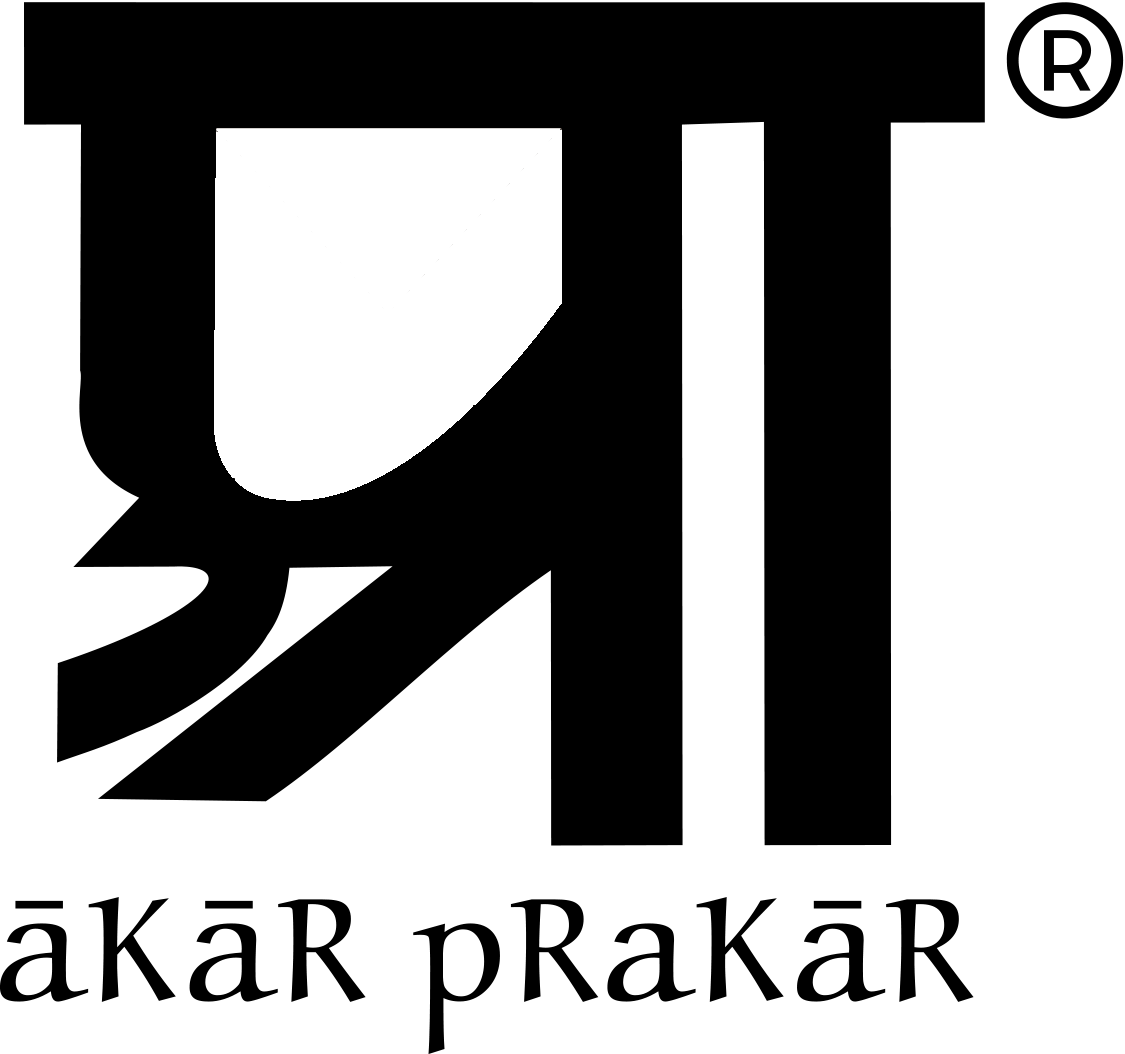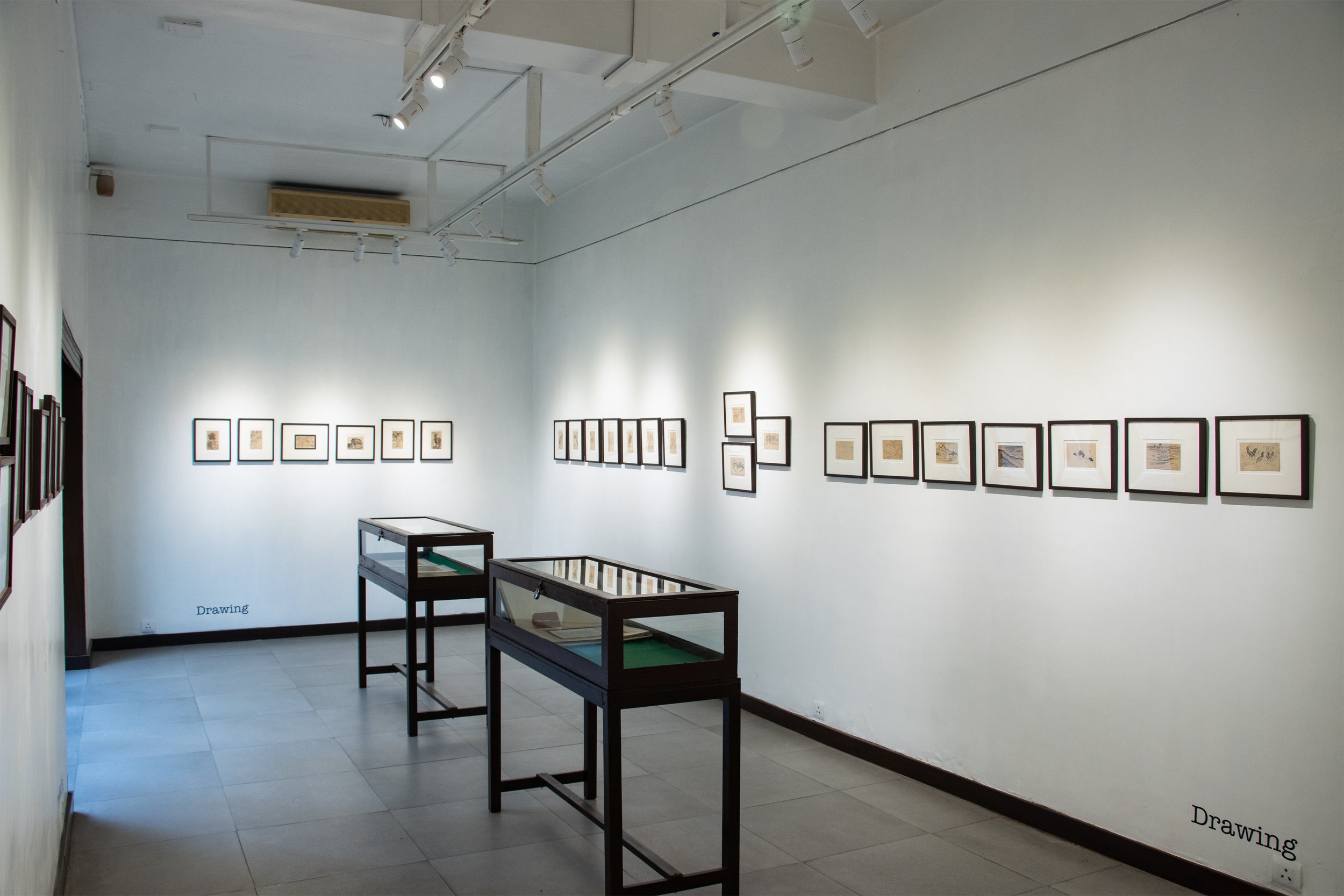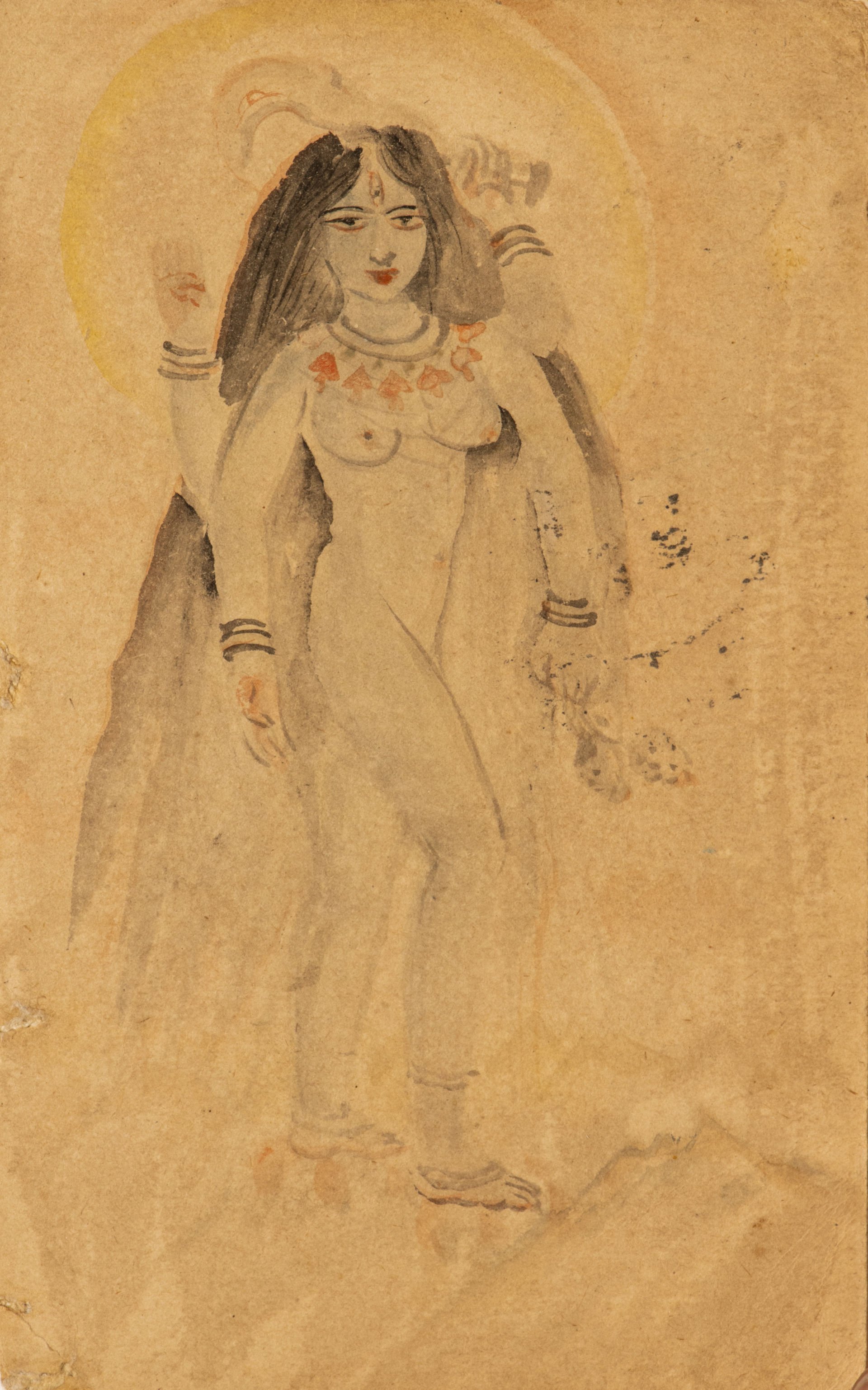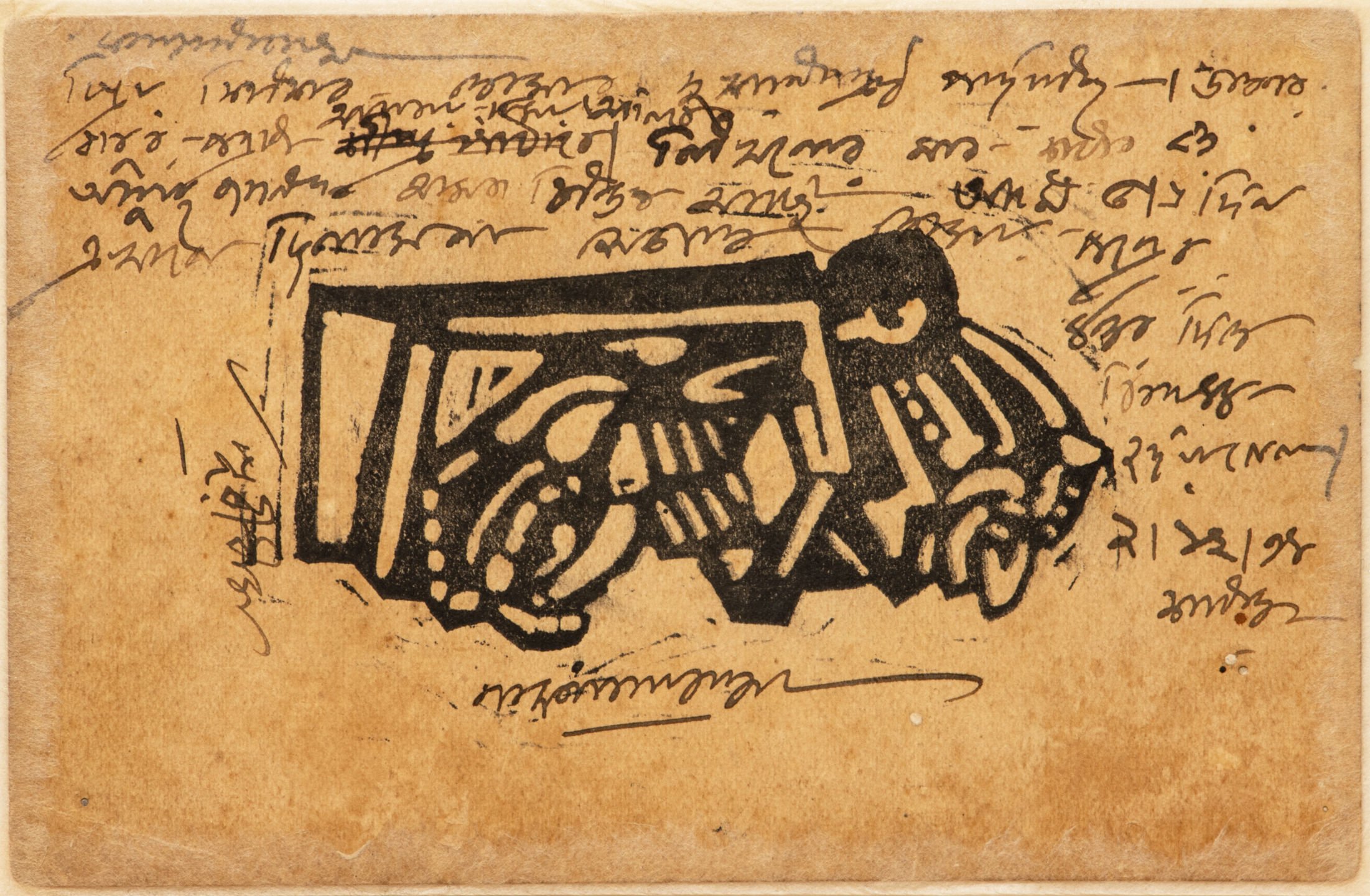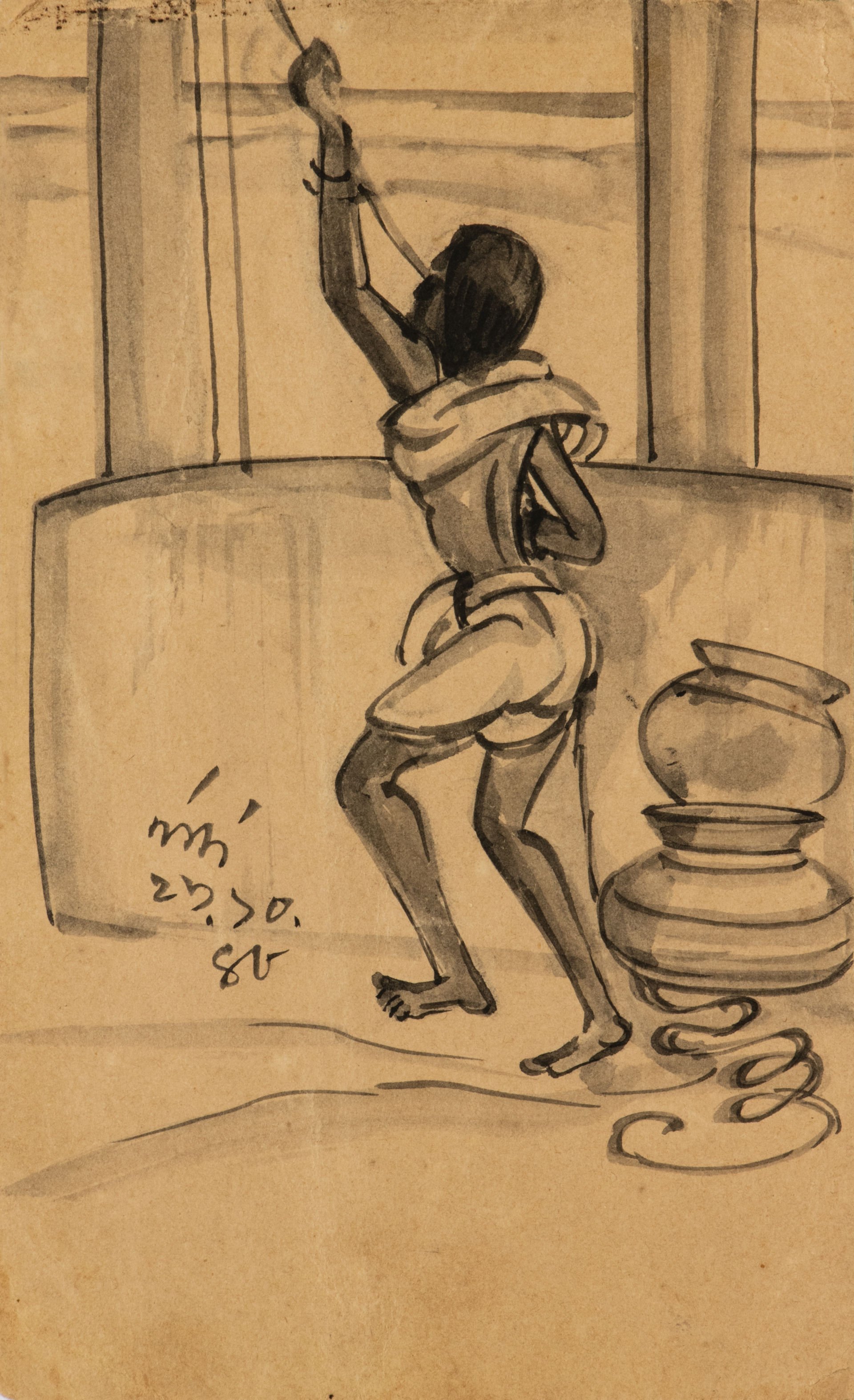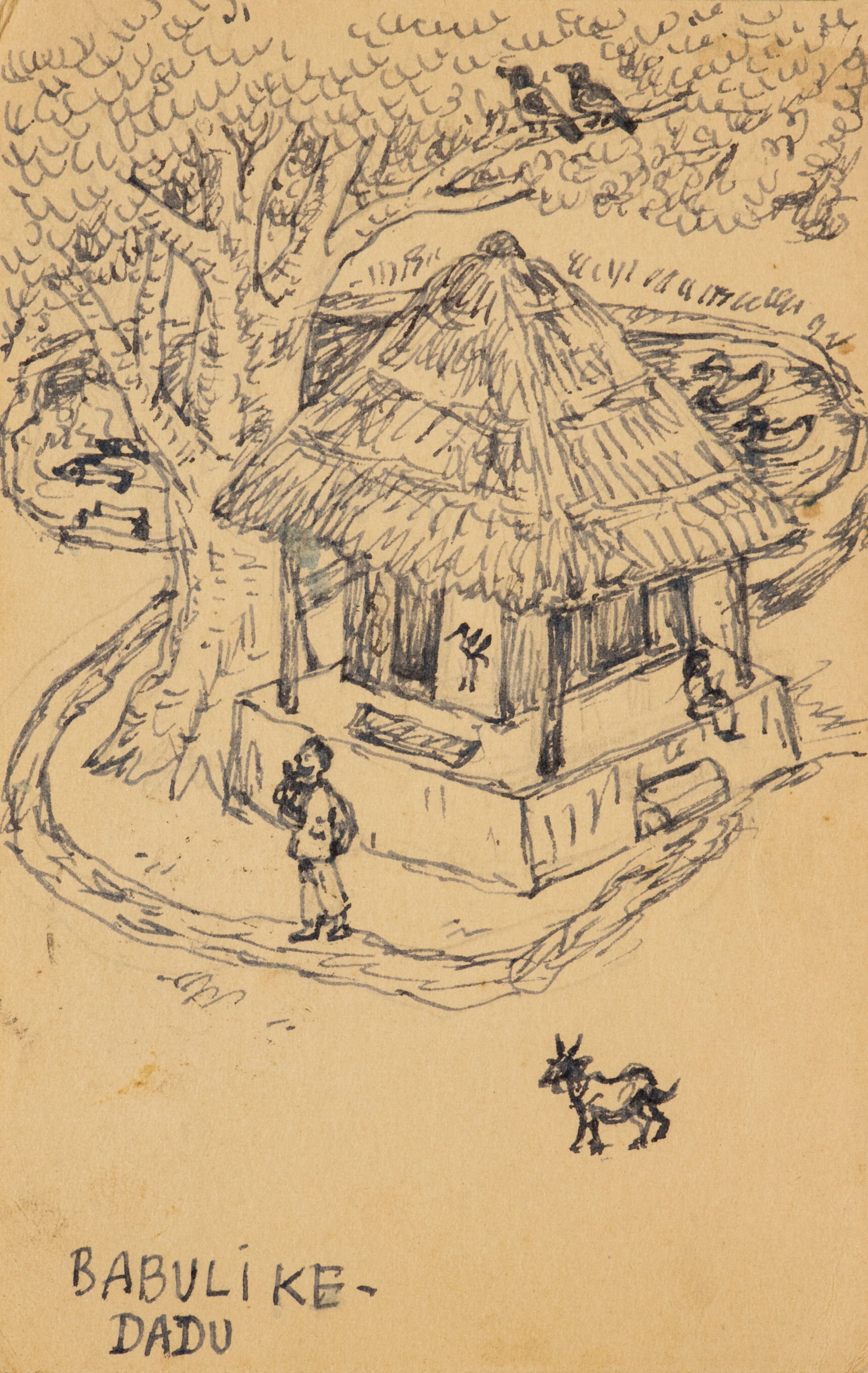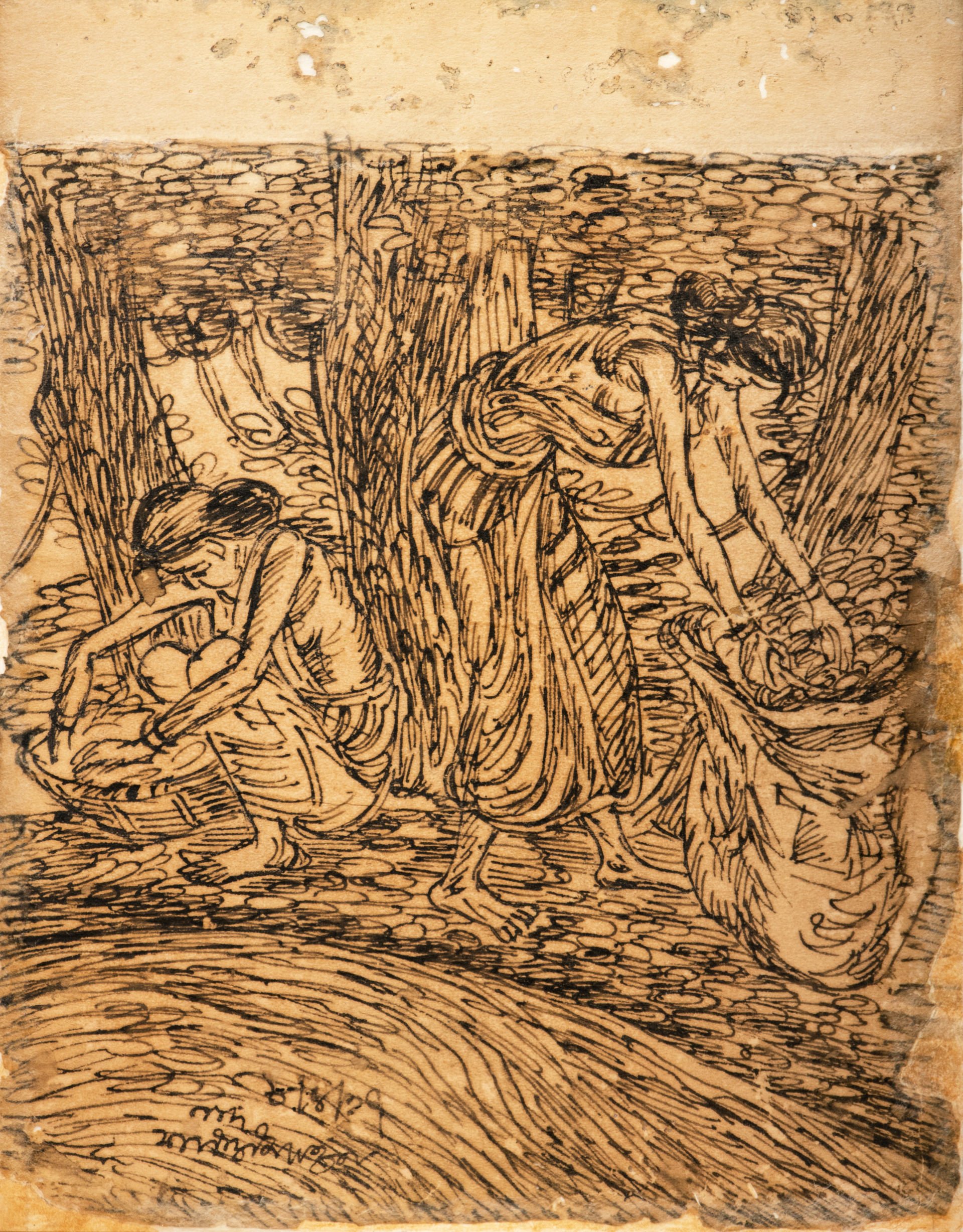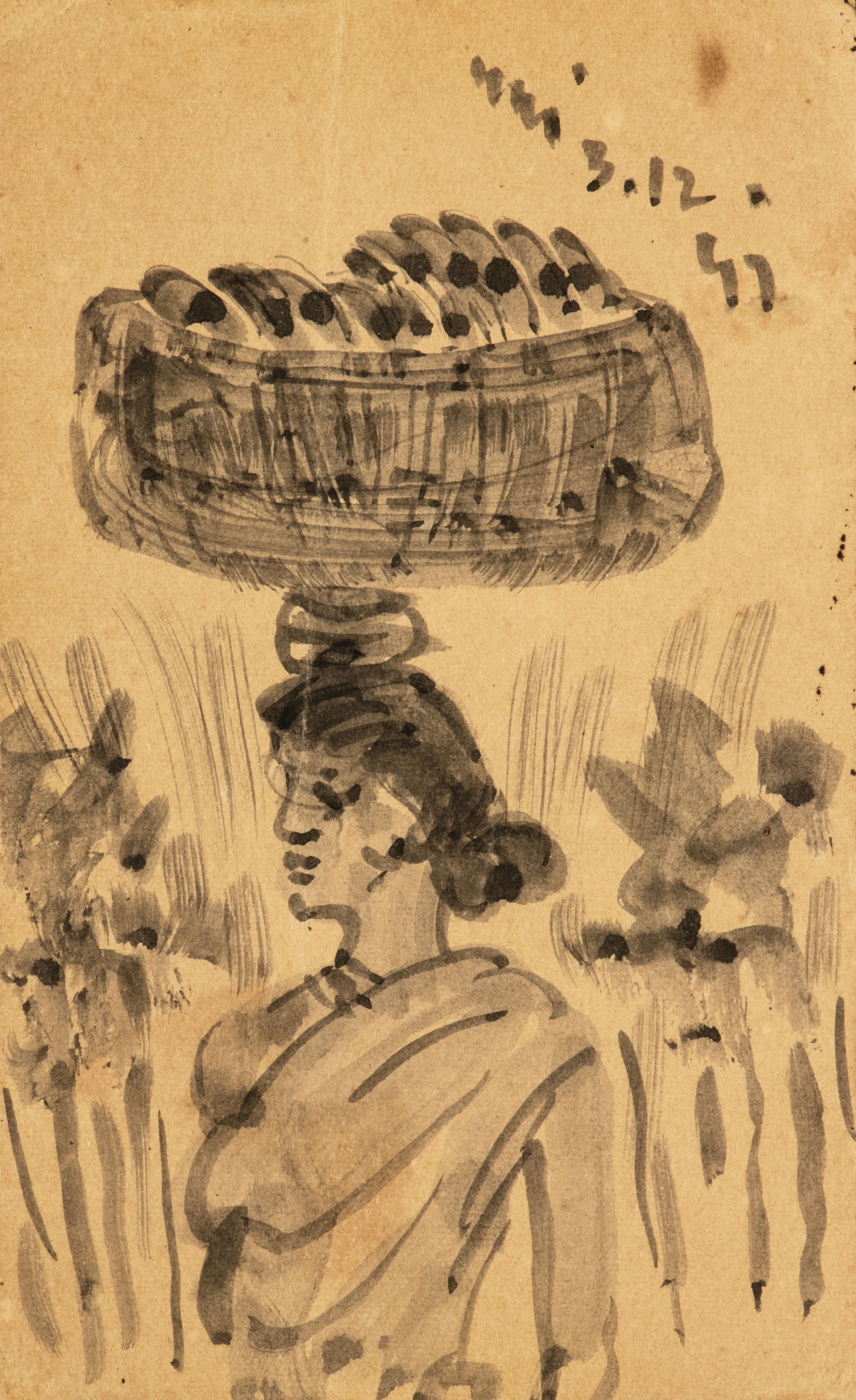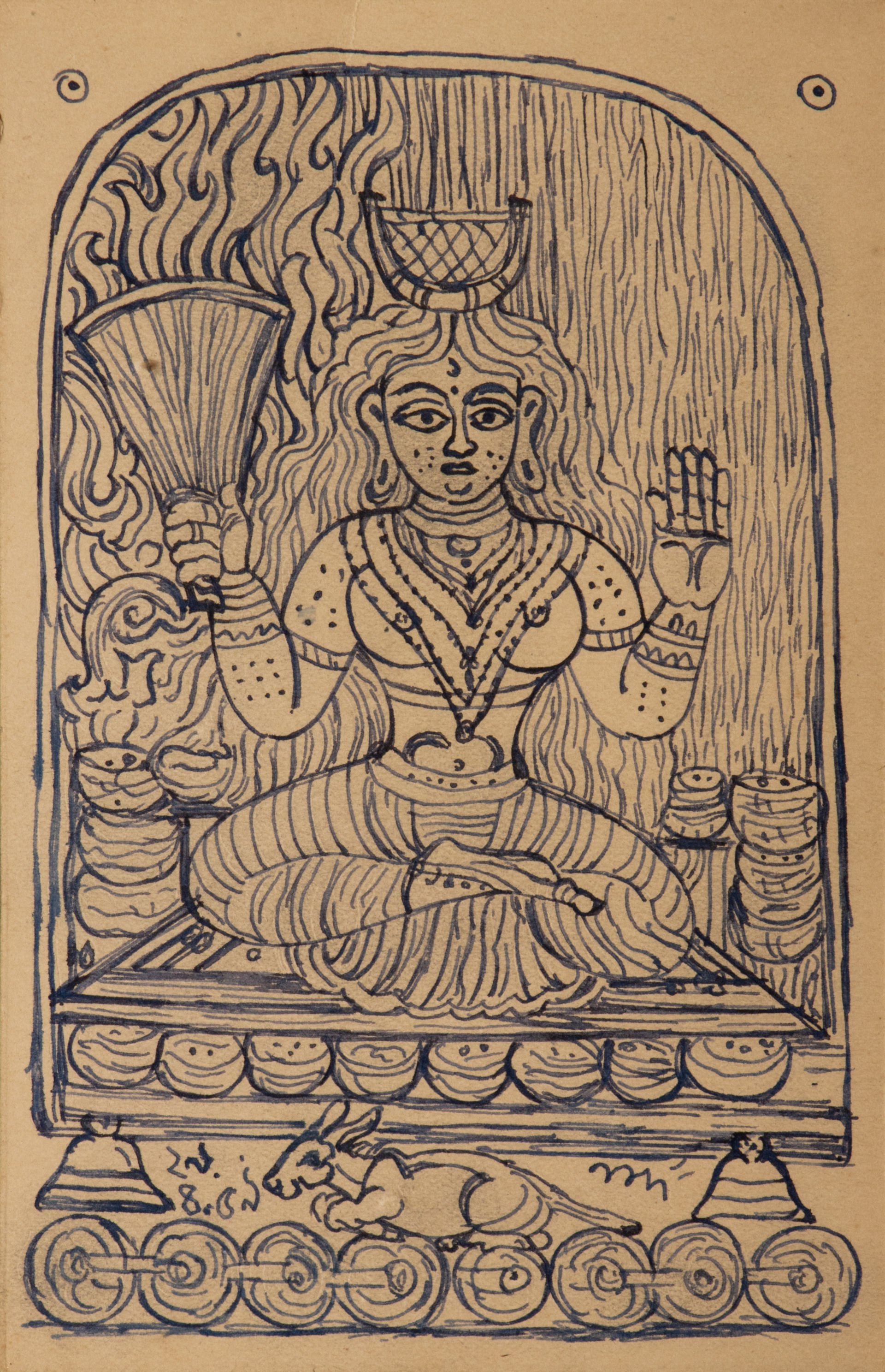
Nandalal Bose
January 27 – March 18, 2023 at Akar Prakar, Kolkata
“Mastermoshai” (as Nandalal Bose was affectionately called by his students) was perpetually drawing on cards and postcards. However, the pursuit of this activity was not just limited to him. Mastermoshai Nandalal Bose had instilled, both in his students as well as fellow professors, this practice of postcard drawing. Thus everyone, teachers and students alike, would remain engrossed in this vocation.
Most of Nandalal's cards are executed in monochrome - free from the bindings of colour. This approach set him apart from his Guru, Abanindranath Tagore. According to Abanindranth Tagore lines are the containers within which colours are held. He was of the view that it was primarily through colour that a painting could be brought to life. Nandalal, on the other hand, was extremely inquisitive about the many possibilities of lines. He found validation for his search in his encounter with Arai Kampo - leading him further towards his journey of monochromatic works.
It was his travels to East Asia that eventually paved the way for his huge body of work in brush and ink and strengthened his belief that black and white contain within them the potentialities of all the other colours. The printmaking techniques which became integral to the pedagogic practices of Kala Bhavana were also a result of Nandalal's travels to China and Japan. He had brought back with him various ukiyo-e prints and wood blocks.
While Indian classical art was highly encouraging of the use of a polychromatic colour scheme, the empowered use of monochrome brought with Nandalal the ‘Asian mode’ of understanding as a pedagogical practice to Santiniketan. Among the two schools of landscape painting - the Western traditions shaped by the likes of Constable and Turner and that of the Chinese Landscape tradition - he was drawn towards the latter’s approach to nature and landscape painting. This further underscores his inclination towards an Asian belief system. When speaking of Nandalal's inspirations from Japan, his strong affirmation of the local and the current surroundings comes to light. This becomes an integral part of his cards.
In this current exhibition, we attempt to highlight how cards/postcards bring out tangents of Nandalal Bose that have remained unnoticed otherwise. This exhibition attempts to bring to light Nandalal’s departure from the earlier influence of Abanindranath Tagore to the influences that Ramakrishna, Rabindranath and Gandhi had on his art practice. It will also highlight Nandalal’s search for spirituality within nature and the establishment of the Asian aesthetic mode. The exhibition will thus showcase how all these tangents are present throughout his works and some of the best can be found in his cards and postcards.
Curated by Debdutta Gupta
Nandalal Bose | Untitled | Watercolour on paper | 5.25 x 3.25 in
Nandalal Bose | Old Calcutta | Ink and brush | 5.25 x 3.25 in
Nandalal Bose | Dhutura phool | Ink and brush | 5.5 x 3.5 in | 1953
Nandalal Bose | Untitled | Watercolour on paper | 5.5 x 3.5 in
Nandalal Bose | Untitled | Ink and brush on paper | 5.25 x 3.5 in | 1948
Nandalal Bose | Untitled | Pen and ink | 3.25 x 5.25 in | 1935
Nandalal Bose | Untitled | Woodcut | 3.5 x 5.5 in | 1934-35
Nandalal Bose | Untitled | Pen and ink on postcard | 5.5 x 3.5 in | 1955
Nandalal Bose | Untitled | Ink and brush on postcard | 5.5 x 3.5 in | 1948
Nandalal Bose | Untitled | Pen and ink on postcard | 5.5 x 3.5 in | 1957
Nandalal Bose | Untitled | Collage | 5.5 x 3.5 in | 1956
Nandalal Bose | Untitled | Ink and brush on postcard | 4 x 6 in | 1954
Nandalal Bose | Untitled | Watercolour on paper | 3.5 x 2.75 in | 1953
Nandalal Bose | Bapuji | Woodcut print on paper | 12 x 7.25 in | 1930
Nandalal Bose | Santiniketan | Watercolour on paper | 5.25 x 3.25 in | 1930
Nandalal Bose | Sketchbook Drawing | 9.75 x 8.5 in | 1937
Nandalal Bose | Untitled | Ink and brush on paper | 5.75 x 4.75 in
Nandalal Bose | Untitled | Ink and brush on paper | 8.75 x 6.75 in | 1937
Nandalal Bose | Untitled | Ink and brush on postcard | 5.5 x 3.5 in
Nandalal Bose | Untitled | Ink and brush on postcard | 5.5 x 3.5 in | 1941
Nandalal Bose | Untitled | Ink and brush on postcard | 6 x 4 in | 1945
Nandalal Bose | Untitled | Pen and ink on paper | 6.5 x 9.75 in
Nandalal Bose | Untitled | Pen and ink on postcard | 3.5 x 5 in
Nandalal Bose | Untitled | Pen and ink on postcard | 3.5 x 5.5 in | 1948
Nandalal Bose | Untitled | Pen and ink on postcard | 3.5 x 5.5 in | 1952
Nandalal Bose | Untitled | Pen and ink on postcard | 3.25 x 5.25 in | 1935
Nandalal Bose | Untitled | Pen and ink | 3.5 x 5.5 in | 1959
Nandalal Bose | Untitled | Pen and ink | 5.5 x 3.5 in | 1959
Nandalal Bose | Untitled | Watercolour on paper | 10 x 9 in | 1938
Nandalal Bose
Born in Kharagpur, Bihar in 1882, Nandalal Bose was one of the pioneers of modern Indian art and a significant figure of Contextual Modernism. He became the Principal of Kala Bhavan, Santiniketan in 1921 and taught some of the greatest artists of the 20th century including K.G. Subramanyan, Benode Behari Mukherjee, Ramkinkar Baij and Satyajit Ray, to name a few. In his artistic practice, Bose was greatly influenced by the Tagore family, E. B. Havell, A. K. Coomaraswamy and Mahatma Gandhi. He was recognized not only for his paintings and murals, and his role as a pedagogue but also for his postcard drawings, the renderings of plays by Rabindranath Tagore, and for his designing and execution of the venues of the Indian National Congress conventions in Lucknow, Faizpur and Haripura from 1935 to 1938. Although he had already gained international recognition as a modern artist, his association with Gandhi elevated him to the position of a national icon. Moreover, he was entrusted with the task of designing and illustrating the original manuscript of the Constitution of India, creating 22 unique illustrations depicting scenes from India's historical and cultural past. In 1954, he was honoured with the Padma Vibhushan award.
Nandalal Bose passed away on 16th April, 1966, at the age of 83 in Calcutta.
